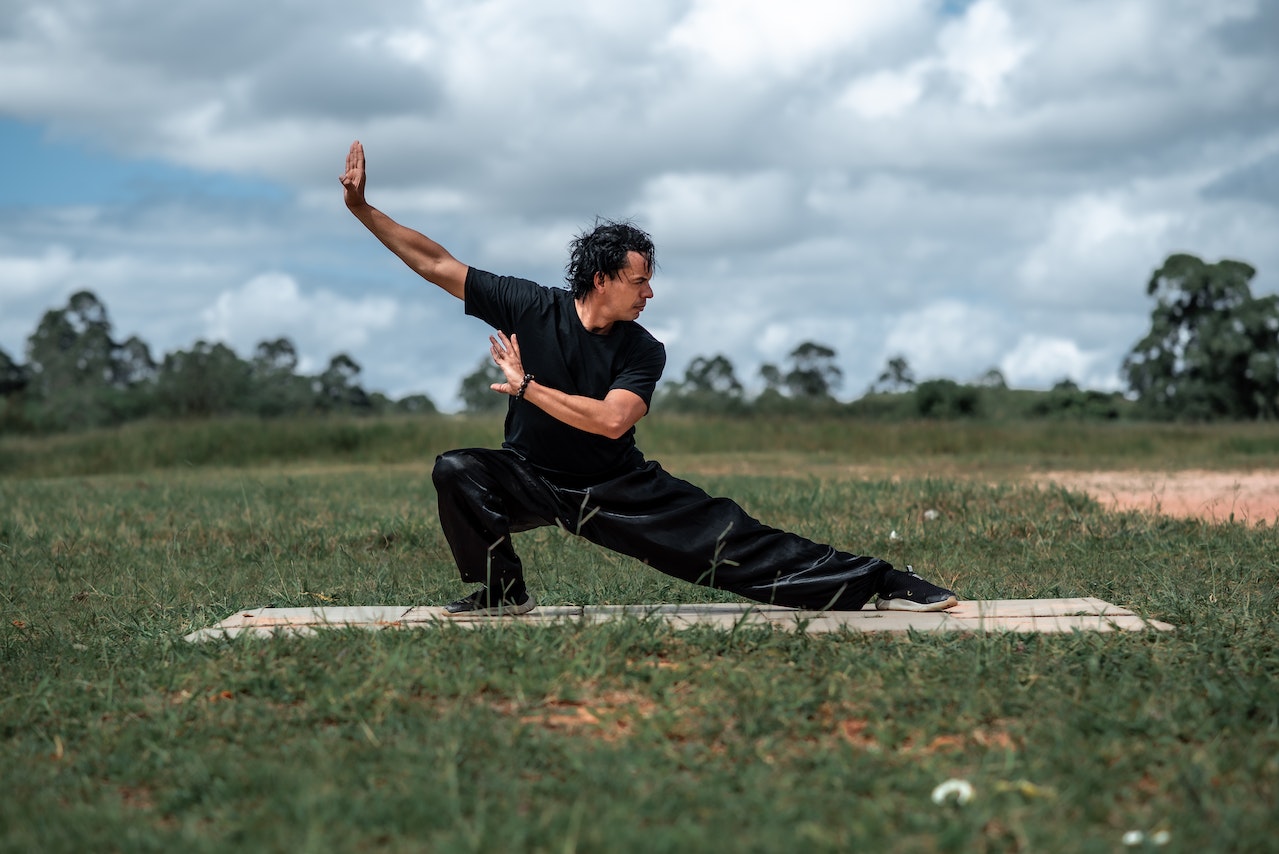The Benefits Of Tai Chi For Health - How It Can Improve Your Health And Happiness
The benefits of Tai Chi for health, include improving physical and mental well-being, reducing stress, and increasing flexibility and balance. In this article, we will explore the many benefits of Tai Chi for health in detail.
Author:Suleman ShahReviewer:Han JuFeb 15, 202398.2K Shares1.6M Views

The benefits of Tai Chi for health, including improving physical and mental well-being, reducing stress, and increasing flexibility and balance. In this article, we will explore the many benefits of Tai Chi for healthin detail.
Tai Chi, also known as Tai Chi Chuan, is a type of martial art that originated in China and has been practiced for over 900 years. It is a form of physical exercise that emphasizes slow and smooth movements, deep breathing, and mindfulness.
Introduction To Tai Chi
Tai Chi is a gentle and low-impact form of exercise that is suitable for people of all ages and fitness levels.
It consists of a series of flowing movements that are performed slowly and deliberately. These movements are designed to help improve balance, increase flexibility, and promote mindfulness.
Tai Chi is often referred to as "meditation in motion" because of its focus on breathing and mental concentration.
History Of Tai Chi
Tai Chi, also known as Tai Chi Chuan, is a traditional Chinese martial art that has been practiced for centuries for its health benefits.
Tai Chi is a gentle and slow form of exercise that emphasizes fluid movements, deep breathing, and mindfulness. It was developed in China over 900 years ago and has since become popular worldwide as a form of exercise and meditation.
The Benefits Of Tai Chi For Physical Health
Tai Chi Has Been Shown To Have Several Physical Health Benefits, Including.
Improving Balance And Coordination
Tai Chi is known for its ability to improve balance and coordination. The slow, deliberate movements of Tai Chi help to train the body to maintain stability, which can reduce the risk of falls in older adults.
Tai Chi also helps to improve posture, which can help to alleviate back pain and improve overall physical function.
Increasing Flexibility And Strength
Tai Chi is a form of exercise that can help to improve flexibility and strength. The slow movements and deep breathing of Tai Chi help to increase blood flow and oxygenation to the muscles, which can improve their flexibility and strength.
Additionally, Tai Chi can help to improve muscle endurance, which is essential for maintaining physical function as we age.
Reducing Pain And Inflammation
Tai Chi has been shown to have pain-relieving effects, particularly for people with chronic pain conditions such as osteoarthritis and fibromyalgia.
The gentle movements of Tai Chi can help to reduce inflammationand increase circulation, which can help to relieve pain.
The Benefits Of Tai Chi For Mental Health
In addition to its physical health benefits, Tai Chi has also been shown to have several mental healthbenefits, including:
Reducing Stress And Anxiety
Tai Chi is a form of exercise that is known for its ability to reduce stress and anxiety. The slow, deliberate movements of Tai Chi can help to calm the mind and reduce feelings of stress and anxiety.
Additionally, the focus on deep breathing and mindfulness in Tai Chi can help to improve relaxation and reduce the symptoms of stress and anxiety.
Improving Mental Function
Tai Chi has been shown to have positive effects on mental function, including improving memory, concentration, and cognitive function.
This may be because Tai Chi helps to increase blood flow and oxygenation to the brain, which is important for maintaining healthy brain function.
The Science Behind The Benefits Of Tai Chi For Health
Tai Chi is a traditional Chinese martial art that has been practiced for centuries for its health benefits. In recent years, scientific research has begun to shed light on the mechanisms behind these health benefits, and the results are encouraging.
Here is a closer look at the sciencebehind the benefits of Tai Chi for health. The science behind the benefits of Tai Chi for health is promising.
From reducing pain and inflammation to improving balance and coordination and reducing stress and anxiety, Tai Chi appears to be a powerful tool for promoting overall health and well-being.
If you are interested in exploring the benefits of Tai Chi for your health, consider taking a class or speaking with a Tai Chi instructor.
Tai Chi For Health - A Guide To Starting Your Practice
Tai Chi is a gentle and low-impact exercise that has been shown to have numerous health benefits. If you are interested in starting a Tai Chi practice for your health, here is a guide to help get you started.
Finding A Class Or Instructor
The first step in starting a Tai Chi practice is finding a class or instructor. Many community centers, YMCAs, and health clubs offer Tai Chi classes, and you can also find Tai Chi classes at local parks or community centers.
If you prefer to learn one-on-one with an instructor, you can search for private Tai Chi lessons in your area.
When selecting a class or instructor, look for someone with experience and training in Tai Chi. Ask about their background and training, and if possible, observe a class or lesson before committing to a particular instructor or program.
Starting Your Practice
Tai Chi is a slow and gentle form of exercise, and it is important to start slow and gradually increase your practice as your body becomes accustomed to the movements.
Most Tai Chi routines include a series of flowing movements, and it is important to focus on your breathing and the sensations in your body as you move.
It is recommended to practice Tai Chi for at least 20-30 minutes a day, 3-4 times a week. As you become more comfortable with the movements, you can gradually increase the length and frequency of your practice.

The Health Benefits of Tai Chi: Art and Science
The Future Of Tai Chi And Its Role In Promoting Health And Well-Being
Tai Chi has been practiced for centuries and has been shown to have numerous health benefits.
As our understanding of the health benefits of Tai Chi continues to grow, it is clear that Tai Chi will play an increasingly important role in promoting health and well-being in the future.
Integration Into Western Medicine
One of the trends in the future of Tai Chi is its integration into Western medicine. More and more medical professionals are recognizing the health benefits of Tai Chi and are incorporating it into treatment plans for their patients.
In the future, Tai Chi will likely be prescribed by doctors and healthcare professionals as a complementary therapyfor a variety of health conditions, including chronic pain, heart disease, and mental health disorders.
Expansion Into Community And Workplace Settings
Another trend in the future of Tai Chi is its expansion into community and workplace settings. Tai Chi programs are being offered in schools, community centers, and workplace wellness programs to promote health and well-being for people of all ages.
In the future, Tai Chi will continue to be an important tool for promoting health and well-being in these settings.
Technological Advancements
Technological advancements will also influence the future of Tai Chi. Online Tai Chi classes and virtual Tai Chi programs are becoming more popular, making Tai Chi accessible to people who may not have access to traditional styles.
In the future, virtual Tai Chi programs and technology-based Tai Chi products will likely continue to evolve, making Tai Chi even more accessible and convenient.
People Also Ask
What Is Tai Chi And How Is It Performed?
Tai Chi is a low-impact form of exercise that originated in China. It involves a series of slow, flowing movements performed in a meditative state, and is often described as "moving meditation."
What Are The Health Benefits Of Tai Chi?
Tai Chi has been shown to have numerous health benefits, including improved balance and coordination, reduced pain and inflammation, reduced stress and anxiety, and improved mental function.
Is Tai Chi Suitable For All Ages And Fitness Levels?
Tai Chi is a low-impact form of exercise that is suitable for people of all ages and fitness levels.
Conclusion
The Benefits of Tai Chi for Health are numerous and varied. Tai Chi is a low-impact form of exercise that is suitable for people of all ages and fitness levels, and it has been shown to have several physical and mental health benefits.
Whether you are looking to improve balance and coordination, increase flexibility and strength, reduce stress and anxiety, or improve mental function, Tai Chi is an excellent choice.
If you are interested in learning more about the many benefits of Tai Chi for health, consider taking a class or talking to a Tai Chi instructor to see if it is right for you.
Jump to
Introduction To Tai Chi
History Of Tai Chi
The Benefits Of Tai Chi For Physical Health
The Benefits Of Tai Chi For Mental Health
The Science Behind The Benefits Of Tai Chi For Health
Tai Chi For Health - A Guide To Starting Your Practice
The Future Of Tai Chi And Its Role In Promoting Health And Well-Being
People Also Ask
Conclusion

Suleman Shah
Author
Suleman Shah is a researcher and freelance writer. As a researcher, he has worked with MNS University of Agriculture, Multan (Pakistan) and Texas A & M University (USA). He regularly writes science articles and blogs for science news website immersse.com and open access publishers OA Publishing London and Scientific Times. He loves to keep himself updated on scientific developments and convert these developments into everyday language to update the readers about the developments in the scientific era. His primary research focus is Plant sciences, and he contributed to this field by publishing his research in scientific journals and presenting his work at many Conferences.
Shah graduated from the University of Agriculture Faisalabad (Pakistan) and started his professional carrier with Jaffer Agro Services and later with the Agriculture Department of the Government of Pakistan. His research interest compelled and attracted him to proceed with his carrier in Plant sciences research. So, he started his Ph.D. in Soil Science at MNS University of Agriculture Multan (Pakistan). Later, he started working as a visiting scholar with Texas A&M University (USA).
Shah’s experience with big Open Excess publishers like Springers, Frontiers, MDPI, etc., testified to his belief in Open Access as a barrier-removing mechanism between researchers and the readers of their research. Shah believes that Open Access is revolutionizing the publication process and benefitting research in all fields.

Han Ju
Reviewer
Hello! I'm Han Ju, the heart behind World Wide Journals. My life is a unique tapestry woven from the threads of news, spirituality, and science, enriched by melodies from my guitar. Raised amidst tales of the ancient and the arcane, I developed a keen eye for the stories that truly matter. Through my work, I seek to bridge the seen with the unseen, marrying the rigor of science with the depth of spirituality.
Each article at World Wide Journals is a piece of this ongoing quest, blending analysis with personal reflection. Whether exploring quantum frontiers or strumming chords under the stars, my aim is to inspire and provoke thought, inviting you into a world where every discovery is a note in the grand symphony of existence.
Welcome aboard this journey of insight and exploration, where curiosity leads and music guides.
Latest Articles
Popular Articles
